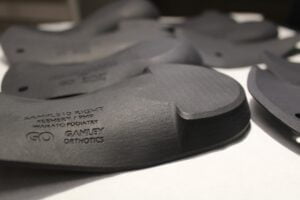How Can You Tell If You Need Orthotics?
Seen the guys on your sports team wearing orthotics? Maybe your coworker just got some, or a friend mentioned she was taking her child to get fitted for a new pair. If you’ve never had a pair of foot orthotics before, it’s natural to wonder: how do I know if I need orthotics, too?
It’s a great question. Being one of Hamilton’s premier podiatry clinics specialising in custom foot orthotics and sports medicine, here’s what you need to know about these custom insoles and how you can tell if you may need orthotics too.
Why Do People Wear Orthotics In The First Place?
To know if you could benefit from orthotics, you need to understand why people may wear them in the first place. For the majority of people, they have orthotics because at some point (whether past or present), they’ve had a foot injury, pain or other foot or leg-related problem. Heel pain is a common one. Examples of other types of problems where orthotics help include pain beneath the big toe in runners (called sesamoiditis), and issues with performance in sports, where inefficiencies in the way the feet and legs are being loaded naturally may hinder performance.
For these people, they will have attended an appointment with a podiatrist, who carried out a comprehensive assessment and gait analysis, and determined that given their unique characteristics and goals, orthotics were clinically indicated (as backed by research and experience) to be able to help. They will then have spent up to half an hour having measurements taken, their podiatrist will have analysed their gait, and completed a prescription form so that their orthotics could be manufactured by a dedicated orthotics laboratory. It’s quite similar to the process of making prescription glasses, including the level of expertise to get the prescription just right. If you want to know more about this and how orthotics work, read this article.
Once the original issue has resolved or the pain has gone, most people choose to continue to wear their orthotics when they’re being active or spending a lot of time on their feet because their orthotics can now offer preventative benefits, alongside the comfort that they offer. By continuing to adjust and better control the way the feet and legs are being loaded, many people can avoid excessive stress on certain tissues and joints, and therefore prevent the recurrence of pain or a new injury developing. Over time, changes occur in muscle tightness, muscle strength, the type of activity a person does, the type of footwear they use, and their body composition - all of these affect your feet and, in turn, the needs from your shoes and orthotics.
When talking about why people wear orthotics, we should also make a quick note on footwear. Due to their design, certain types of shoes may compromise the stability of the foot and ankle and be more likely to cause issues, particularly if you have any underlying weakness or concerns. Common examples are football boots, golf shoes, some business shoes and certain running shoes. We tend to see this when things like a shoe’s aesthetic appearance may work against their functionality. In these cases, orthotics can also be a valuable aid to help promote foot functionality and comfort.
Note: Not All Orthotics Are Equal
Before we dive into some ways to tell if you may need (or benefit from) custom foot orthotics, it’s important to clarify what is meant by ‘orthotics’. To do this, we look at two things: what the orthotic is, and who made it.
It’s unfortunate that in our modern marketing-heavy world, many are quick to create a basic shoe liner and label it an ‘orthotic’. Legally they can, because the term is unregulated here in New Zealand, and so, they do. This means that some people’s version of an ‘orthotic’ looks like a gel pad that sticks to the inside of your shoe, others have shoes that come with standard one-type-fits-all “orthotic liners”, others have what essentially is a piece of foam designed for cushioning. And all of these are referred to as “orthotics”, without a second thought. We’re not going to be talking about how to tell if you need these kinds of inserts, because they typically have little benefit, and any benefits from some added cushioning are typically short-lived. Moreover, they don’t address injuries and pain in the way that true custom foot orthotics, which are medical devices, do.
The second thing to consider is who you’re getting your orthotics from. Registered podiatrists are the only health professionals in New Zealand that spend at least three years exclusively learning about lower limb function, biomechanics and conditions, before going on to work exclusively with the feet and legs, really honing in their knowledge in this area. Orthopaedic surgeons are the exception, but their focus is lower limb surgery, not orthotic prescription. Podiatrists hold a wealth of knowledge of how your joints and tissues work together to produce movement - and the impact that modifying the way your feet are loaded using orthotics will have. You wouldn’t go to a fashionable sunglasses store to get a prescription pair of glasses, you’d book in for an assessment with your optometrist. It’s much the same with custom foot orthotics and podiatry.
How Do I Know If I Need Orthotics?
So with all of this said, how can you tell if you need or could benefit from orthotics? Here are a few indicators that the topic of orthotics could be worth a discussion with your podiatrist.
You’re struggling with one of the following conditions:
- Heel pain, whether from plantar fasciitis or another cause
- Achilles pain at the back of the heel
- Morton’s neuroma
- Metatarsalgia (forefoot pain)
- Shin splints and shin pain
- Ankle pain or instability
- Arthritis
- Sesamoiditis, turf toe or other toe pains or problems
- Leg length difference
- Stress fractures
- Tendon damage
There are many other foot and lower limb problems that may indicate custom foot orthotics as part of a management plan to support a speedy and optimal recovery, but the list above are the ones we see in our clinic most often.
You have lingering or recurring foot pain
If you’ve had foot pain or discomfort for some time now, and you feel like you just can’t shake it or you’ve become used to its on-again-off-again nature, it could be worthwhile talking to your podiatrist. When we hear that pain is lingering or continues to recur, and there’s no autoimmune disease or other issue to account for it, it tells us that at least one of the causative factors that is leading to the problem is not being addressed. And if you’ve never had foot orthotics, then it may be the stress being placed on the bones, joints and muscles of your feet through the way they are being loaded. If that’s the case, orthotics could make a large difference for both your comfort and your quality of life.
Your kids are getting foot pain, or are walking funny
If you’ve been noticing something about the way your child walks that you find concerning, or they’re complaining of foot pain that has been dismissed as growing pains without any further investigation or care beyond “waiting it out”, then it’s a good sign to see your podiatrist and chat about whether or not orthotics could help.
Just like with adult feet, there’s always a reason behind any foot pain or abnormal walking patterns. It’s a common misconception that pain is just a normal part of growing - if we can address the reason behind it, we can help your child enjoy staying happy and active on their feet, and be able to play and run around with their friends.

You’re getting tired, achy legs at the end of your day
Even if you spend over five hours of your workday on your feet, getting tired and achy legs isn’t actually “part of the job” or expected. There will be a reason (or several reasons), and for many, it’s related to their foot biomechanics, meaning how your bones, joints, muscles and ligaments all work together to produce movement. If that’s the case for you, orthotics may be able to help. We’ve actually written an article about how to stop achy feet and legs at work - read it here.
You have concerns about your foot health or mobility
If you’re worried about your foot health, whether it’s the impact that your flat feet may be having or you have concerns about maintaining your mobility long into the future, then it’s definitely worth booking in and having a talk with your podiatrist. Custom foot orthotics may or may not be part of the solution when addressing your concerns, but if they’re not, your podiatrist will be able to clarify what will be to get you the outcomes you want, both now and long into the future.
When You Likely Don’t Need Orthotics
While there is great value in having orthotics for those that need them, being medical devices, custom foot orthotics are definitely not just freely recommended or handed out when there is no clear benefit or function. That’d be like getting a prescription for custom glasses when you have perfect vision. Our podiatrists here at Waikato Podiatry will only recommend and prescribe foot orthotics if there is strong evidence that they are likely to help to improve your foot-related concerns or pain, and improve your quality of life.
If you have no injury, are not experiencing pain or discomfort in your feet or legs, are going full days at work and through your sports training without any problems, then it’s highly likely that you do not require orthotics.
Orthotics At Waikato Podiatry
 Our podiatrists are highly experienced in all aspects of orthotic assessment and prescription, with our Senior Podiatrist and Director, Andrew Jones, working extensively with athletes for orthotic care and overall management for almost 25 years. We also work with a trained orthotist with 40 years experience who helps us to achieve great outcomes with footwear modifications and orthotics, even when they’re very complex in nature. We do our own modifications in-house, so it’s quick and easy for you, helping optimise your recovery.
Our podiatrists are highly experienced in all aspects of orthotic assessment and prescription, with our Senior Podiatrist and Director, Andrew Jones, working extensively with athletes for orthotic care and overall management for almost 25 years. We also work with a trained orthotist with 40 years experience who helps us to achieve great outcomes with footwear modifications and orthotics, even when they’re very complex in nature. We do our own modifications in-house, so it’s quick and easy for you, helping optimise your recovery.
To book an appointment with our podiatry team here at Waikato Podiatry, call us on 07 838 0003, or use our online booking portal.
Providing the people of Waikato with a centre of podiatry excellence

